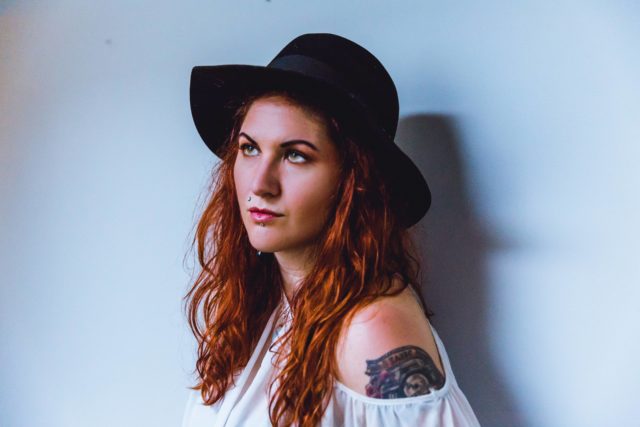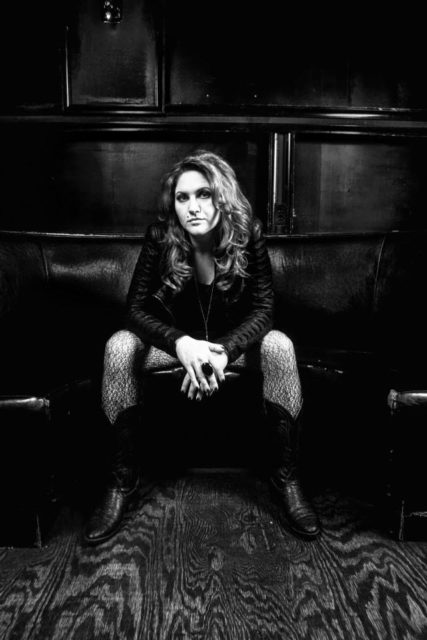Welcome to “Seven Minutes in Heaven,” GO Magazine’s brand new interview series that profiles a different queer lady each day, by asking her seven unique (and sometimes random) questions. Get to know the thoughts, feelings, and opinions of the groundbreaking, fierce forces-of-nature in the queer community.

When we first started this series in an attempt to highlight the amazing work women in our community are doing, I never expected it to grow the way it has. I’m continually blown away by the incredible people we feature on Seven Minutes in Heaven and today is no different.
Meghann Wright is a singer-songwriter and you can tell that she has stories to tell through her music but also throughout this interview. She string words together in a way that pulls people in wanting to hear more. Wright tells GO about navigating her bisexuality growing up in Hawaii, how she had to petition to bring her girlfriend to Prom and how her music career has grown to include advocacy for survivors of domestic violence.
Wright is truly a force to be reckon with.
GO Magazine: Who are you and what do you do?
Meghann Wright: I am Meghann Wright, a singer-songwriter turned music industry professional. I started GrindEthos Artist Services LLC to help other artists with their careers. My experience includes national touring, label collaboration, professional songwriting, live performance, and more. Another outlet for my experience includes a community of female-identifying singer-songwriters called The City & The Heart. I founded TC&TH as a supportive organization to help other independent female artists in the NY area with things like recording, booking shows, meeting industry pros and more. We put on showcases to fund the production of our first DIY compilation album which was produced by Will Hensley (Regina Spektor, Coldplay) at Premier Studios NY with the help of Tatiana Moroz and Christina LaRocca.
Then it evolved into philanthropic endeavor, we now donate all proceeds from our album sales to Safe Horizon, a non-profit benefiting victims of Domestic Violence. This was originally out of our desire to help women in need, but we realized benefiting all people in need is of greater good. We were attracted to working with SH because they make it a point to assist people of the LGTB community as well.
GO: What fuels your work/activism?
MW: I grew up in a time and a place where freedom, sexuality, and creativity were not really encouraged in the mainstream. I’m from Hawaii and in the 90s when I started to be interested in relationships and music, creativity was only found in the small and tightly-knit underground punk scene, and bisexuality was pretty unheard of. Coming to New York, I found more acceptance and met more people like myself who wanted to shed the constraints of their upbringing or hometowns, and I wanted to help them do that.
I remember in high school, I didn’t even know what to call myself, I knew I was attracted to both men and women, and it wasn’t until I was around 16 that I heard and understood the term bisexual. When I told my mom that I wanted to bring my girlfriend to prom, she was really confused and asked if I was gay. I explained that I was equally attracted to both men and women, and she was, to put it bluntly, weirded out. At my high school, no one had ever brought a same sex partner to prom, so I actually had to have people sign a petition to allow me to bring her, and at the prom we weren’t allowed to hold hands, dance together, or show any kind of affection. We took a pretty hot prom photo together though.

GO: How do you hope to see bisexual visibility improve in the LGBTQ community?
MW: Oddly enough, I have often received criticism for identifying as bisexual from people who identify as lesbian or gay just as often as from people who identify as straight. Things they have said include “you’re greedy” or “noncommittal,” or they have implied it’s somehow easier because I can pretend to be straight when I need to, which is absolutely ridiculous. I hope that bisexuality is more widely accepted as a valid sexual orientation or identification without those who are bisexual suffering prejudice or hate of any kind.
GO: Where do you go for inspiration when you’re feeling discouraged or depleted?
MW: When I’m feeling discouraged or depleted, I turn to music. I love all genres of music and find inspiration from indie artists to mainstream pop. I am very involved in the metal community, there you can find a lot of acceptance for people of all walks of life, and true creative freedom in many forms.
GO: How do you hope to create more dialogue around holistic healing practices in the LGBTQ community?
MW: I’m a strong advocate for holistic healing practices. My mother is something of a witch, we grew up with tinctures, tarot, meditation, and all kinds of hippy stuff haha. I know modern pharmaceuticals can be extremely helpful in certain situations, but I think a lot of our mental and emotional hangups, body issues, ill feelings and more are often a result of toxicity in their past or in society.
I believe spiritual healing in all of its forms is extremely important, regardless of what creed a personal chooses to follow. It’s also extremely important to take physical care of oneself from eating natural organic foods free of GMO or pesticides and also sexual health is vital to a good life and a thriving community. Education is key to this. There needs to be more open dialogue about how we treat each other and ourselves, what we are putting in our bodies, and how we take care of ourselves.

GO: Who are you bisexual role models?
MW: There are some pretty amazing high-profile bisexuals throughout history including Freddie Mercury, Greta Garbo, Joan Baez, etc. but I don’t think of any of them as role models, at least not for myself. I never really had role models growing up, and kind of had to look for mentors where I could find them.
I think if bisexuality had been more visible or more widely accepted, I would have been less private about my sexuality and would have felt better about it. I will say that bisexual professor Alfred Kinsey is an amazing figure who has been instrumental in helping people to understand and accept sexuality in it’s rainbow of forms.
GO: Where can people find you?
MW: If people want to hear my music, I can be found on all platforms including Spotify, Soundcloud, Bandcamp, iTunes, etc., just look for Meghann Wright. If they want to follow my musings, I’m @meghannbwright on Twitter, @meghannwrightmusic on Instagram and MeghannWrightMusic on Facebook. I’m also playing a show with Jonah Matranga at Mercury Lounge October 22. And the fourth volume of The City and The Heart is coming out October 6 on Bandcamp, Spotify and iTunes so check that out!

What Do You Think?